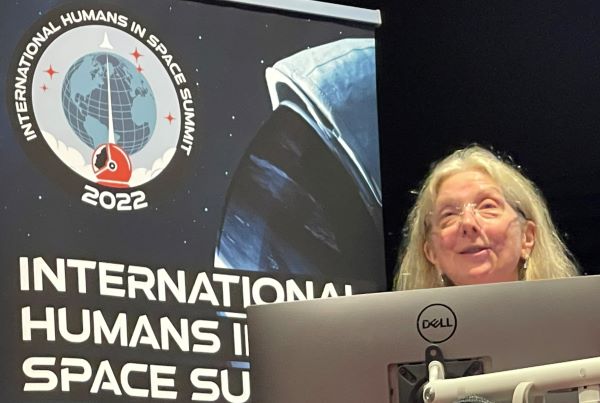Melbourne Medical School launches space medicine education program
This year the Department of Medical Education offered seven new Discovery subjects for MD1 students. Human Health in the Space Environment is currently one of only two programs in the world offering accredited space medicine education for medical students.

Dr Rowena Christiansen, who is a founder of the ad astra vita project and the International Humans in Space Summit.
The international significance of the new Discovery subject has been recognised through an invitation by the Education and Training Committee of the globally recognised Aerospace Medical Association (AsMA), for topic coordinator Dr Rowena Christiansen to participate in a panel on space medicine education for the next AsMA annual scientific meeting in New Orleans next year. The panel will also feature four US-based initiatives.
Rowena is a Founder of the ad astra vita project and the International Humans in Space Summit (IHS2022), and together with co-founder Dr Joshua Chou (University of Technology, Sydney), recently coordinated a highly successful hybrid fourth iteration of the Summit. As one of the aims of IHS2022 is to support STEAM education and outreach, the recordings from the conference are freely available on YouTube. Professor Peter Choong, Head of the Department of Surgery and Associate Dean, Innovation and Enterprise, and Professor Bruce Thompson, Head, Melbourne School of Health Sciences, were two of the invited keynote speakers. It was pleasing to see that some of the space health students chose to submit a presentation to the conference.
November has been a busy time for outreach. Rowena also spoke on the hazards of human spaceflight for the conference’s satellite Austronaut workshop, the risks and rewards of commercial spaceflight for the Asia-Pacific Space Cooperation Organization (APSCO) and Arab Union for Astronomy and Space Sciences (AUASS) International Symposium in Jordan, and gave an introduction to the new Discovery Subject for the United Nations/China Global Partnership Workshop on Space Exploration and Innovation.
As a member of the Australian Space Agency (ASA) Technical Advisory Group on Space Medicine and Life Sciences, Rowena has contributed to the forthcoming ASA Roadmap on Applied Space Medicine and Life Sciences, which will highlight Australian capabilities and opportunities in this sector.
Through its educational initiatives, research capabilities, and enthusiasm for the bi-directional translational possibilities flowing from space, the Melbourne Medical School is well-placed to play a leading role in developing this exciting new area of endeavour.